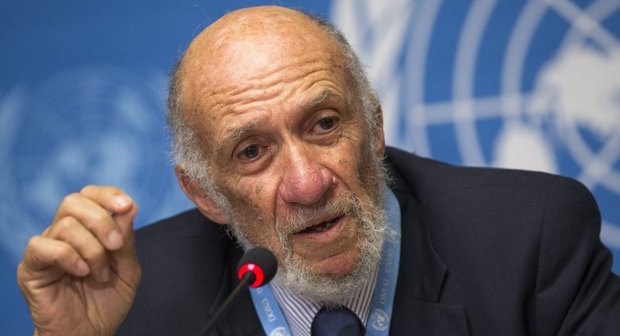Sunday 14 October 2018 - 23:19
Story Code : 323226
Sanctions imposed on Iran contrary to UN charter: ex-UN official
Former United Nations High Commissioner for Human Rights says �the sanctions being imposed on Iran to be contrary to the UN Charter and international law, and to involve an unlawful threat and use of force. Limiting Iran�s sovereign rights in these fundamental ways also has a detrimental effect on the human rights of the Iranian people.�
Following is the full text of the interview:
The International Court of Justice (ICJ) ordered the US to lift a part of its restrictive measures against Iran. Do you think that Trump administration will commit to respecting the vote?
In my judgment, it is doubtful that the U.S. will comply with such restrictive measures as it seems to be adopting the position that its sovereign rights take precedence over any international obligations. It has denounced the International Criminal Court, but has not as yet responded formally to this decision by the ICJ. If it rejects the authority of the ICJ it will be an escalated repudiation of international law as unlike the ICC, the U.S. is a party to the Statute of the ICJ.
The ICJ suggested that the US avoids the implementation of forthcoming sanctions against Iran. Shall we expect the US to respect the vote?
As suggested, the U.S. during the Trump presidency has insisted that there is no higher authority than the U.S. government. It is possible that without acknowledging the authority of the ICJ the U.S. will quietly comply, and refrain from implementing the sanctions at this stage. I rather doubt it given the warmongering speech of Netanyahu and Trump at the UN earlier in the month. To accept the ICJ interim measures would probably be treated as a show of weakness that would contradict the way in which the U.S. is trying to project its power internationally, and particularly toward Iran.
ICJ ordered the U.S. to allow the exports of "humanitarian" goods such as food, medicines, agricultural products and aviation safety equipment. Do you think that the U.S. will exclude these items from the sanctions?
Again I believe the most probable response is that the U.S. will repudiate the ICJ�s authority, and thus will not obey these exclusions. Possibly, if there is any sensitivity to international public opinion some humanitarian concessions will be made on an informal basis.
According to ICJ, the US must lift the restrictions on "humanitarian" goods but as you know, on a general basis, the sanctions will place the strict limits on Iran financial transactions. What�s your opinion on this matter?
I consider the sanctions being imposed on Iran to be contrary to the UN Charter and international law, and to involve an unlawful threat and use of force. Limiting Iran�s sovereign rights in these fundamental ways also has a detrimental effect on the human rights of the Iranian people. I would hope that in its final decision will agree with my legal analysis, but as of now, we must wait and see. As far as I know, the U.S. has not agreed to participate in the ICJ proceedings, which is a way of repudiating the decision, and even challenging the jurisdiction of this tribunal, which is the highest source of legal authority in the UN System.
By: Javad Heirannia
# Tags











